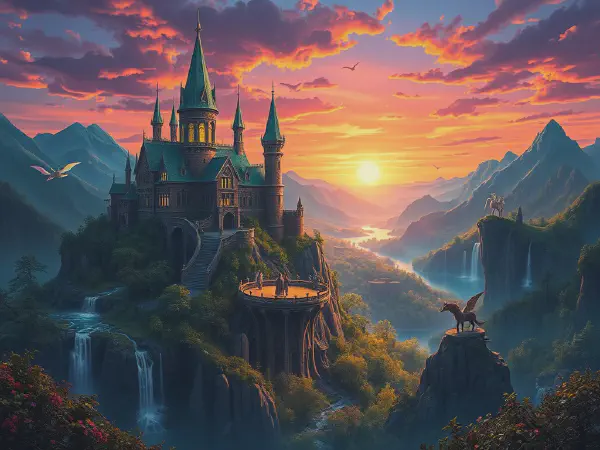Exploring Magical Schools: A Fictional Adventure

A Journey Through Magical Schools in Fiction
A Journey Through Magical Schools in Fiction explores the captivating realm of magical education that has enchanted readers and audiences alike. From the hallowed halls of Hogwarts to the enchanting classrooms of Brakebills, these institutions serve as foundational structures in fantasy literature, often shaping the narratives and character development of their protagonists. This article delves into the significance of magical schools in various fictional universes, examining notable schools, unique systems, iconic characters, and thematic elements woven into their stories.
The allure of magical schools lies not only in their ability to teach the arcane arts but also in their representation of growth, discovery, and adventure. A Journey Through Magical Schools in Fiction showcases how these places become sanctuaries for young wizards and witches, enabling them to confront personal challenges, form lifelong friendships, and face off against formidable adversaries. The walls of these schools resonate with the echoes of laughter, lessons, and life-changing experiences, making them unforgettable settings in the genre.
Notably, magical schools also reflect societal structures, academia, and cultural values present within their worlds. They serve as microcosms of larger fantasy societies, often mirroring real-world issues such as prejudice, rivalry, and the quest for identity. Through the lens of magical education, authors explore the complexities of growth and society, inviting readers to engage with the moral dilemmas faced by their characters.
Throughout history, various cultures have celebrated the unique allure and knowledge offered by Magical Schools, shaping their legends and traditions.
As we embark on A Journey Through Magical Schools in Fiction, we will visit several notable magical schools, examine their unique educational systems, meet iconic characters that embody the spirit of magical learning, and uncover the thematic elements that resonate throughout these enchanting narratives. Each institution brings its own flavor and charm to the magical realm, inviting readers into an unpredictable realm where magic and education intertwine and coalesce.
In conclusion, the exploration of magical schools in fiction not only enhances the rich tapestry of fantasy narratives but also allows readers to invest in the journeys of their beloved characters. By examining the lore of these schools, we gain insight into how they shape the lives of young protagonists and ultimately influence the larger narrative considered in the genre itself.
Notable Magical Schools
Hogwarts School of Witchcraft and Wizardry, perhaps the most famous magical school, is the central hub for young witches and wizards in J.K. Rowling's Harry Potter series. Founded over a thousand years ago, Hogwarts is characterized by its four houses: Gryffindor, Hufflepuff, Ravenclaw, and Slytherin, each with its own distinctive values and traits. The enchanted castle is filled with magical artifacts, hidden chambers, and the ethereal presence of the ghosts of former students. At Hogwarts, students learn subjects such as Potions, Transfiguration, and Defense Against the Dark Arts, all while navigating the trials of adolescence, friendship, and bravery.
Brakebills University from Lev Grossman's The Magicians presents a radically different approach to magical education. This secretive institution is exclusively for individuals who possess innate magical ability. Unlike Hogwarts, Brakebills is located in upstate New York and offers a more modern and academic environment that reflects contemporary youth culture. The curriculum includes studies in various magical disciplines, and students face intense challenges like expulsion and real-world consequences that push them to their limits. With a darker, more adult tone, Brakebills allows readers to explore the burdens of power and the complexities of adult life through magic.
The Caine School of Magic from the Warcraft universe offers a unique twist on magical education, focusing on the coexistence of various races, including humans, elves, and orcs. Students at the Caine School learn to harness elemental forces and combat dark magic, emphasizing teamwork and moral responsibility in a world marked by conflict. This institution reflects the game's emphasis on cooperation and heroism, where students must navigate their personal struggles while protecting their realms from destructive threats, embodying the themes of loyalty, sacrifice, and unity that are central to the Warcraft lore.
Unique Magical School Systems
The curriculum and subjects taught in magical schools often vary significantly, reflecting the narrative's tone and characters. In Hogwarts, the blend of traditional British school subjects with imaginative magical disciplines allows for a balanced education that teaches students both theoretical and practical applications of magic. Conversely, Brakebills promotes a more mature, advanced study of magic, often incorporating real-life challenges and experimental techniques. This divergence illustrates how school systems can shape character arcs and plot development in the fantasy genre.
Entry requirements for magical schools also play a crucial role in the lore of their respective stories. At Hogwarts, students are chosen based on their magical abilities, and a simple letter is delivered via owl to inform them of their acceptance. In contrast, Brakebills has a series of rigorous exams that test a candidate's magical aptitude, establishing a more selective and competitive atmosphere. This difference emphasizes how schools categorize students based on perceived merit and talent, influencing character dynamics within the story.
Cultural differences in magical education contribute to the richness of these fictional worlds. For instance, in Japanese anime like Little Witch Academia, magical schools are depicted with a unique cultural perspective, highlighting the values of perseverance and the importance of friendship in overcoming adversity. Such cultural nuances reflect the diverse approaches to magical education in fantasy storytelling, illustrating how factors like tradition, societal values, and historical context shape the learning experiences of characters across different narratives.
Famous Magical School Characters
Albus Dumbledore, the wise and enigmatic headmaster of Hogwarts, is one of the most iconic characters in the Harry Potter series. He symbolizes the ideal mentor figure, guiding Harry and his friends through their magical education while imparting critical life lessons. Dumbledore's complex moral compass and intricate backstory reveal the deeper themes of sacrifice, power, and the duality of good and evil that permeate the series. His character exemplifies the significant role of mentorship in magical education, illustrating how influential teachers can shape the destinies of their students.
Alice Quinn, a prominent character in The Magicians, is notable for her journey from being an outsider to embracing her magical potential. Her development at Brakebills reflects the struggles many face in discovering their true identities and purpose. Alice's multifaceted personality and resilience against adversity highlight the challenges often faced by students in magical schools, enhancing the complexity of her character and the broader narrative of self-discovery and empowerment.
Luna Lovegood, characterized by her quirky demeanor and unique perspective, brings a refreshing element to Hogwarts. While often underestimated by her peers, Luna exemplifies the importance of individuality and open-mindedness in a magical education. Her whimsical outlook and strong moral compass make her a beacon of empathy and understanding, emphasizing how magical schools can cultivate diverse personalities and encourage students to embrace their uniqueness.
Thematic Elements of Magical Schools
The theme of coming of age is prevalent in narratives centered around magical schools. Characters often face pivotal moments of growth and decision-making as they grapple with their identities, responsibilities, and the pressures of their magical abilities. Whether it's Harry confronting the darkness within himself at Hogwarts or Alice facing her fears at Brakebills, magical education acts as a crucible for self-discovery and maturation, mirroring the trials many young adults experience in their journeys.
Friendship and rivalry dynamics are central to the experiences of characters in magical schools. The competitive nature of magical education often leads to strong bonds of friendship and equally intense rivalries. At Hogwarts, the house system fosters camaraderie among students while simultaneously accentuating rivalries between houses, exemplified in the longstanding Slytherin vs. Gryffindor feud. Similarly, Brakebills presents a competitive atmosphere where students must navigate their relationships amid intense pressures, showcasing the significance of collaboration and loyalty in a magical context.
The role of mentorship is a crucial thematic element within magical education. Characters like Dumbledore at Hogwarts and Dean Fogg at Brakebills not only provide guidance to their students but also challenge them to harness their strengths and confront their flaws. The relationships between mentors and their protégés underline the importance of support, wisdom, and accountability in the journey toward mastering magic and navigating life's complexities.
Impact of Magical Schools on Fantasy Genre
The influence of magical academies in fantasy literature is undeniable; they have become staple settings that embody the essence of magical learning and the enchantment of discovery. From the global phenomenon of the Harry Potter series to the philosophical explorations in The Magicians, magical schools provide readers with a immersive gateway into fantastical worlds filled with wonder and intrigue. These institutions establish the rules of magic and the moral frameworks within which characters operate, defining the rich landscapes of their narratives.
The evolution of magical schools in modern fiction showcases the genre's adaptability and creativity. Authors are continually reimagining the conventional structure of magical education, exploring themes of diversity, inclusivity, and contemporary societal issues within their narratives. This evolution reflects the changing perceptions of education, and the societal challenges faced by young people today, emphasizing the relevance of magical schools in addressing real-world concerns.
Readers' connection to magical education is profound, often resonating with their own experiences in academic environments. The trials, tribulations, and triumphs faced by characters in these schools strike a chord with readers who have undergone similar journeys. Magical education acts as a vehicle for exploring broader human experiences related to growth, friendship, and self-discovery, making it an enduring theme in fantasy literature that captivates the imagination and evokes empathy.
